
Can Chinese herbs help you have a more comfortable, regular period? Thousands of years of holistic gynecology practice and modern research says “yes”!
Whether you’re riding waves of discomfort each month, looking to enhance your fertility, or simply aiming to boost your overall well-being, Traditional Chinese Medicine (TCM) is a natural approach to improving your menstrual health.
While many women are brought up to believe that irritability, heavy bleeding, painful cramps, headaches, brain fog, and all the other symptoms that can come along with your monthly flow are “just part of being a woman,” TCM sees them as warning signs. They signal an imbalance – but an imbalance that can be improved or eliminated with the help of herbal medicine, diet, and lifestyle habits.
Let’s dive into the world of TCM gynecology to understand more about what makes a “healthy period” and the herbal tools you can use to reduce your symptoms and embrace a smoother monthly flow.
What is a Healthy Period?
Before we dive into how to achieve a healthy period, it’s important to know what a healthy period actually looks and feels like.
In the West, a “normal” period is often defined by medical textbooks: a cycle lasting anywhere from 21 to 35 days, with bleeding that persists for 3 to 7 days. Symptoms like light cramping are considered par for the course, but anything that deviates significantly from this may warrant a closer look. If more significant issues are found (like fibroids, hormone imbalance, or PCOS), doctors typically prescribe birth control medications to override the body’s natural cycle.
From a TCM perspective, the ideal menstrual cycle looks a little different. Ideally, a period would arrive without much fanfare: no significant pain, minimal to no PMS, and a flow that is smooth, of a cranberry red hue, indicating optimal circulation within the womb. Having a cycle like this is a sign of balanced Qi (energy) and well-functioning organ systems. When there is significant pain, clotting, dark or pale blood, irregularity, or other symptoms that come along with your cycle, that means there is an imbalance at play.
Period Problems: How TCM Explains Common Menstrual Issues
If your cycle doesn’t quite match TCM’s shining example of a healthy period, don’t worry. We’re all prone to different imbalances that can affect our menstrual cycles and our overall health. Working towards a healthier cycle is only possible once you know where your imbalances lie and how to reverse them.
So, how does TCM address period problems?
TCM views the menstrual cycle through a unique lens, emphasizing the flow of Qi and the balance between Yin (the body’s cooling, nourishing energy) and Yang (its warming, active energy). Unlike Western medicine, which often focuses on symptoms and hormonal imbalances, TCM looks at menstrual issues as signs of deeper imbalances within the body.
There are many different possible imbalances, but a few common issues tend to be at the root of many women’s challenges:
Common Patterns of Disharmony
- Qi Stagnation
When the body’s vital energy, Qi, is not flowing freely, it can easily cause issues in the menstrual cycle. This often happens in response to emotional stress or lack of exercise. Qi stagnation can manifest as premenstrual tension, mood swings, and painful periods with a distending pain in the breasts or abdomen. Systemically, it might cause stress, frustration, and a feeling of being “stuck,” both emotionally and physically. - Blood Stasis
Blood stasis occurs when the circulation of blood is blocked, causing it to pool or clot in certain areas. Imagine a dam holding back water in a stream; blood stasis acts the same, preventing the smooth flow of blood and leading to sharp, stabbing pains and the formation of masses. This can result in extremely painful periods with dark, clotted blood, indicating that the blood is not flowing as it should. It can also be a factor in conditions like fibroids or endometriosis, where blood does not move properly and causes significant discomfort. - Yin Deficiency
Yin represents the body’s cooling, moistening, and nourishing functions. When Yin is deficient, the body lacks this necessary moisture and becomes dry and overheated. This deficiency can lead to menstrual irregularities such as a scanty, light-colored flow or amenorrhea (no menstrual cycle). Yin deficiency can also manifest as night sweats, insomnia, and a general feeling of heat in the evenings, along with dryness of the skin, eyes, or throat. - Yang Deficiency
Yang is the complement to yin; it is the warming, activating energy in the body. A deficiency in Yang is like a hearth without enough fire to cook food or warm the house. This can lead to coldness, fatigue, and a sense of sluggishness. In terms of menstruation, Yang deficiency might be at the root of cold limbs, swelling, and heavy periods with pale blood. Those with yang deficiency also tend to experience chronic fatigue, always feeling cold, and digestive issues.
Common Gynecological Conditions that TCM Supports
The menstrual cycle is the foundation of reproductive health for women. When our periods are out of balance, it can cause other issues to develop. Here, TCM takes a similar root-cause approach, addressing both symptoms and the deeper imbalance at play.
- Premenstrual Syndrome (PMS)
In TCM, PMS is often seen as a result of Liver Qi stagnation, which affects the smooth flow of energy and blood in the body. Symptoms like irritability, mood swings, breast tenderness, and bloating are the most common signs. TCM treatments focus on moving Qi and balancing the Liver (like Xiao Yao Tang) to alleviate these symptoms. - Polycystic Ovary Syndrome (PCOS)
PCOS is characterized by irregular menstrual cycles, polycystic ovaries, and increased levels of male hormones. TCM views PCOS as a result of phlegm-damp accumulation and Kidney deficiency, which leads to an interruption in regular ovulation. Herbal formulas Gui Zhi Fu Ling Wan are used to clear dampness, eliminate cysts, and address the root causes of PCOS. - Endometriosis
This painful condition where endometrial tissue grows outside the uterus. In TCM, this is typically related to blood stasis and qi stagnation, which blocks the flow of blood and causes pain and menstrual irregularities. Blood-moving formulas like Xue Fu Zhu Yu Wan are used to invigorate blood, reduce pain, and break up endometrial growths. - Menstrual Irregularities
The menstrual cycle is an intricately complex dance of hormones, qi, blood, yin, yang, and many other factors. As such, irregularities can easily arise, such as irregular periods, heavy bleeding, or scanty flow. TCM diagnoses can vary from blood deficiency (leading to light or missed periods) to qi stagnation (slowing or stopping the cycle) to heat in the blood (causing heavy or early periods) – all with different formulas to help based on your unique circumstances. - Fertility Issues
The health of your menstrual cycle can be a key indicator into your fertility. Whether your cycle is irregular, heavy, light, painful, or imbalanced in another way, TCM herbal formulas for fertility can help restore balance. By first regulating the menstrual cycle, we lay a fertile foundation for a healthy pregnancy.
The Best Chinese Herbs for a Healthy Period
Understanding the phases of your menstrual cycle can empower you to live in harmony with your body’s natural rhythms. Here’s how you can support each phase with Chinese herbs and lifestyle tips.
Follicular Phase: The Phase of Renewal
The follicular phase overlaps with the menstrual or bleeding phase, and begins on day one of your period, and lasts until you ovulate.
The focus of the follicular phase is to trigger the body to develop a new egg to be released for ovulation (and conception). Here, we see a characteristic rise in estrogen. This hormone works to rebuild the uterine lining and prepare the body for potential ovulation.
TCM views this phase as a time of Yin growth, where nourishment and substance in the body are built up. It’s a period of renewal and growth, and mirrors the spring season.
Energy levels and mood often improve with this increase in estrogen, and symptoms are mild. However, issues like heat or stagnation could contribute to a too-short or too-long follicular phase that disrupt the cycle.
The Best Chinese Herbs for the Follicular Phase
Herbal formulas at this time work to support Yin and Blood.
-
Sale!
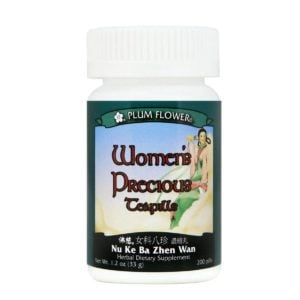 Plum Flower – Women’s Precious (Nu Ke Ba Zhen Wan)
Starting at $20.63
Add to CartSelect options
This product has multiple variants. The options may be chosen on the product page
Plum Flower – Women’s Precious (Nu Ke Ba Zhen Wan)
Starting at $20.63
Add to CartSelect options
This product has multiple variants. The options may be chosen on the product page
Nu Ke Ba Zhen Tang
This formula combines herbs like Dang Gui and Bai Shao to nourish blood and Qi, supporting the body’s building phase. It helps to rebuild energy and blood after the period and set the stage for a healthy cycle.
Si Wu Tang
Those with blood deficiency may struggle with extreme fatigue, brain fog, or sleep issues during the follicular phase when blood reserves are low. Si wu tang helps nourish and build new blood to restore energy and balance.
Lifestyle Habits for the Follicular Phase
- Diet: Incorporate foods rich in antioxidants and B-vitamins to support energy levels and cellular renewal, such as berries, leafy greens, and whole grains.
- Exercise: After bleeding stops, get moving with high-intensity interval training (HIIT) or brisk walking to make the most of your increased energy levels and improve your cardiovascular health and mood.
- Self-Care: Embrace the energy of growth and renewal in this phase by engaging in creative hobbies.
Ovulatory Phase: Peak of Fertility
Once the egg is fully developed, we move on to the ovulatory phase. This phase sees a peak in estrogen and luteinizing hormone (LH), which leads to the release of an egg. Testosterone also spikes briefly, which can give you a boost libido and energy.
Here, the peak of Yin makes a transition to Yang, reflecting a shift from nourishment to activity and warmth, akin to the summer season.
The Best Chinese Herbs for the Ovulatory Phase
Herbal formulas for this stage can help move qi and ensure smooth and pain-free ovulation.
Wen Jing Tang
This formula has many uses during the menstrual cycle. During ovulation, it can help move Qi and blood and promote the transition from Yin to Yang. It also supports optimal fertility and balances the body’s energy during ovulation.
-
Sale!
 Xiao Yao Tang (Free And Easy Wanderer) – Liquid Extract (Tincture)
Starting at $14.00
Add to CartSelect options
This product has multiple variants. The options may be chosen on the product page
Xiao Yao Tang (Free And Easy Wanderer) – Liquid Extract (Tincture)
Starting at $14.00
Add to CartSelect options
This product has multiple variants. The options may be chosen on the product page
Xiao Yao Tang
For those who struggle with ovulatory bloating or pain (called Mittelschmerz), the go-to qi moving formula Xiao Yao Wan can help break through stagnant energy during this phase and encourage a smooth ovulation.
Lifestyle Habits for the Ovulatory Phase
- Diet: Focus on lighter, energy-boosting foods like fresh fruits, vegetables, and lean proteins to support the body’s peak fertility stage.
- Exercise: During this phase, you can engage in more vigorous activities like cycling, running, or dancing to harness the phase’s high energy and support healthy Qi flow.
- Self-Care: With a natural burst in energy, this can be a great time to enjoy social outings or dive deep into personal projects.
Luteal Phase: Preparation and Reflection
In the luteal phase, we experienced rising progesterone levels that prepare the uterus for a potential pregnancy. If fertilization doesn’t occur, estrogen and progesterone levels eventually drop, and our period returns.
In TCM, this phase represents the body’s shift towards Yang, focusing on warmth and activity to support potential pregnancy. It’s a time of rest and conserving energy, so enjoy a little downtime!
The Best Chinese Herbs for the Luteal Phase
Chinese herbs in the luteal phase are focused on reducing PMS symptoms or encouraging a healthy pregnancy.
Jia Wei Xiao Yao Tang
If you’re not trying to conceive, use this phase to balance the body and prevent those pesky PMS symptoms that often show up in this phase. This version of Xiao Yao Wan includes herbs that reduce heat and inflammation to mitigate symptoms like anxiety, irritability, sleep issues, pain, cramping, and headaches.
You Gui Wan
If you are either trying for a baby, or struggle with yang deficiency (always feel cold, fatigued, and sluggish digestion), this formula can help support the natural rise of yang during the luteal phase. With yang-boosting herbs, You Gui Wan encourages the rise in progesterone and supports a potential embryo implantation.
Lifestyle Habits for the Luteal Phase
- Diet: Foods rich in magnesium and calcium, such as nuts, seeds, and leafy greens, can help mitigate PMS symptoms. Focus on nourishing, warming foods to support yang.
- Exercise: Transition to gentle exercises like yoga or pilates, which conserve your energy and keep stress levels low.
- Self-Care: Journaling or meditation can be particularly beneficial for reflecting on emotions and experiences, aligning with the inward energy of this phase.
Menstrual Phase: Release and Renewal
The menstrual phase is the bleeding (or period) phase and lasts 4-7 days for most women. The drop in estrogen and progesterone triggers the shedding of the uterine lining. While PMS is a main symptom in the luteal phase, cramps, pain, headaches, digestive changes, and fatigue are the most common symptoms in the menstrual phase.
In TCM, this phase is associated with the body cleansing itself, akin to the autumn season. It’s a time when the body needs to preserve warmth and focus on letting go, both physically and emotionally.
The Best Chinese Herbs for the Menstrual Phase
Chinese herbs during the menstrual phase support the healthy release of the uterine lining, relax cramping, and help build new blood for the next cycle.
Si Wu Tang
This is a simple, classic formula for building and moving blood and nourishing the body. If you struggle with fatigue or weakness after your period, this formula can help prevent that drop in energy and restore your resources faster. It also supports a smoother menstrual flow and alleviates mild cramps.
Fu Ke Zhong Zi Wan
If you’re someone who needs to take a painkiller to manage your period cramps, this herbal formula may make a helpful natural replacement. It uses blood-moving herbs to both reduce cramps and stop the pain. It also helps pave the way for a more regular and pain-free cycle for next month.
Lifestyle Habits for the Menstrual Phase
- Diet: Warm, iron-rich foods such as red meat, spinach, and lentils help replenish blood loss and support energy levels.
- Exercise: Gentle, restorative activities like yin yoga or leisurely walks honor the body’s need for rest and recovery.
- Self-Care: Warm baths, reading, or other relaxing activities can help soothe the body and mind, promoting a sense of calm and renewal.
Embrace a Healthy, Happy Period with Chinese Herbs
While you may not look forward to your period, you don’t have to dread it either.
By aligning the natural rhythms of your body with TCM wisdom, you can support your menstrual health holistically, turning each phase into an opportunity to reconnect to nature and balance.
While these formulas are a great starting point for most people, the best results come with a personalized approach to Chinese herbal medicine. Learn more about the best Chinese herbs for healthy hormone balance, natural fertility, and more, or shop our full collection of women’s health herbal remedies today!


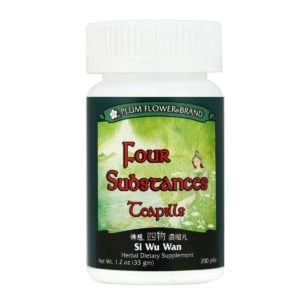 Plum Flower – Four Substances (Si Wu Wan)
Plum Flower – Four Substances (Si Wu Wan)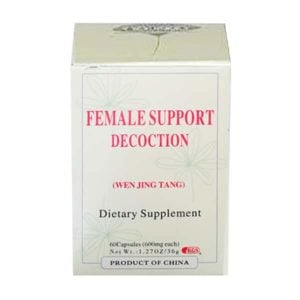 Wen Jing Tang – Evodia Combo Decoction – Lanzhou Traditional Herbs (KGS)
Wen Jing Tang – Evodia Combo Decoction – Lanzhou Traditional Herbs (KGS)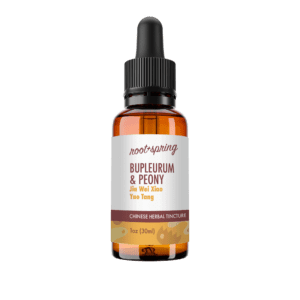 Jia Wei Xiao Yao Tang (Bupleurum and Peony) – Liquid Extract (Tincture)
Jia Wei Xiao Yao Tang (Bupleurum and Peony) – Liquid Extract (Tincture)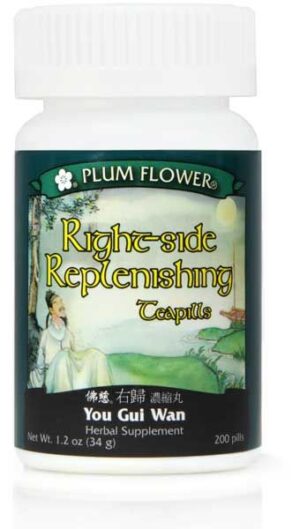 Plum Flower – Right-side Replenishing Teapills (You Gui Wan)
Plum Flower – Right-side Replenishing Teapills (You Gui Wan)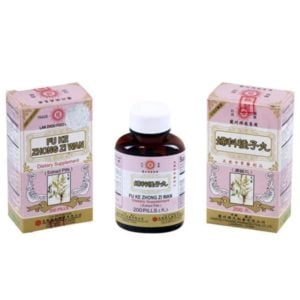 Solstice Medicines (Ci Brand) – Fu Ke Zhong Zi Wan
Solstice Medicines (Ci Brand) – Fu Ke Zhong Zi Wan